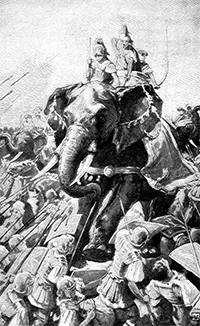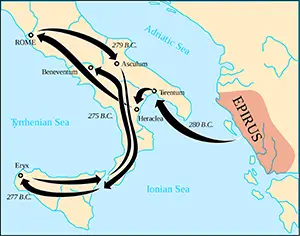Pyrrhus and the War against Rome
Pyrrhus, King of Epirus, led an invasion force against the armies of the Roman Republic in the 2nd Century B.C. As the 4th Century progressed, Rome won more and more of its share of battles with its neighbors, subduing the Latins and then the Samnites and then the Etruscans, absorbing that civilization into its own. Looking to expand its borders, Rome sailed its ships further Pyrrhus, a second cousin of Alexander the Great became King of Epirus in 306 B.C., when he was just 13. In the midst of the war of the Diadochi, Alexander's successors, Pyrrhus briefly lost his throne to Cassander, one of Alexander's generals. Pyrrhus regained his throne in 297 B.C., with the help of another of Alexander's generals, Ptolemy I of Egypt. Pyrrhus returned the favor, helping Lysimachus, one of Alexander's bodyguards, to gain the throne of Greece and Macedon. 
Pyrrhus, at the head of an army of more than 25,000 men and 20 war elephants, invaded Italy and, after defeating a 50,000-man-strong Roman army at Heraclea, marched on Rome. The losses for both sides were heavy for the time. Ancient sources say that Roman losses ranged from 7,000 to 15,000 and that Epirote losses were between 4,000 and 13,000. If the larger figure is true for either side, that is a significant percentage of the force lost. Pyrrhus wasn't done, of course, and armies clashed again in 279 B.C., at Ausculum. They fought each other to a standstill after two days, and a late charge by Pyrrhus's infantry swept the Romans from the field. Roman casualties numbered 6,000, Epirote casualties numbered 3,500. Again, Pyrrhus had won a victory despite losing many men. It was after this battle that Pyrrhus was said to have remarked that another other such victory "would utterly undo him"; this was the genesis of the term Pyrrhic victory. This was also the classic problem with an invading force: It could less easily gain reinforcements. Knowing this, the Romans were content to continue the fighting and refused Pyrrhus's offer of peace, insisting that he leave Italy instead. Instead, Rome negotiated an alliance with Carthage. 
Pyrrhus was unable to take Rome or any other Roman city, primarily because neither the Latins nor any other Italic tribe would side with him against Rome, and contented himself with battling Roman armies in the field. In 278 B.C., Pyrrhus sailed to Sicily and defeated a strong Carthaginian force there, capturing Eryx and Panormus, but could not convince Carthage to call a truce. He ruled as Tyrant of Syracuse for a time. With Tarentum nearly on the verge of collapse, he sailed back to its defense, again encountering Roman armies in the field. At Malventum in 275 B.C., Rome recorded an overwhelming victory, thanks in no small part to the adaptable legion formation, which proved much more effective than the Greek phalanx. Rome had also by this time figured out to deal with Pyrrhus's war elephants, poking them in the sides with spears and sending them crashing out of the battlefield or back against the Epirotes. Pyrrhus retreated first to Tarentun and then to Epirus. Carthage later seized his holdings in Sicily. Nonetheless, Pyrrhus remained popular in his home country. He raised another army and guided it, along with some Gallic allies, to a much closer target, Macedonia. He had success there, deposing King Antigonus II and ruling Macedonia and Thessaly for a time. He had no luck taking Sparta and then fell victim to a quirk of fate in Argos, falling after his horse after being hit on the neck by a roof tile heaved in his direction by an old woman; the momentarily stunned military mastermind could not avoid the sturdy sword of a soldier of Argos, and he died a quick death. When Pyrrhus died in 272 B.C., Tarentum had lost its last ally and surrendered to Rome. It was the last independent city on the Italian peninsula, and so Rome was master of Italy. |
|
Social Studies for Kids
copyright 2002–2024
David White



 afield, including into Tarentum, in order to protect Thurii, in violation of a treaty between that city and the Republic that had been in place since 302 B.C. The leaders of Tarentum reached out to Pyrrhus, king of Epirus, for help; thus began a struggle that was short-lived but long in influence.
afield, including into Tarentum, in order to protect Thurii, in violation of a treaty between that city and the Republic that had been in place since 302 B.C. The leaders of Tarentum reached out to Pyrrhus, king of Epirus, for help; thus began a struggle that was short-lived but long in influence.
